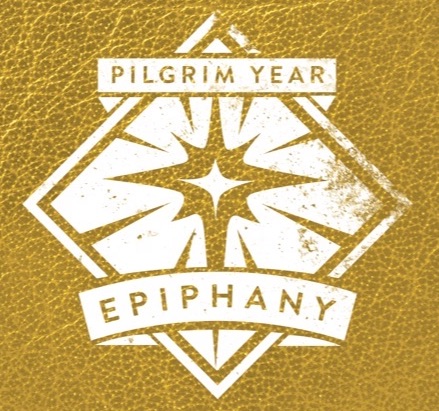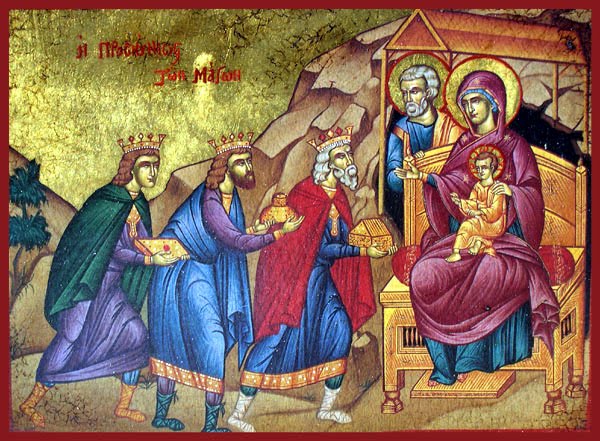
O Light which mak’st the light, which makes the day!
Which set’st the eye without, and mind within;
‘Lighten my spirit with one clear heavenly ray,
Which now to view it self doth first begin.John Davies
News flash! Pagan Princes Discover Jesus through Astrology!
This would be a startling headline to find in the Bible, and my Sunday school teachers would have been horrified to see it put that way. But you have to admit, according to Matthew’s Gospel, that’s kind of how the story unfolds.
When we first meet the magi in Matthew 2:1, they have arrived in Jerusalem after a long journey and are asking, “Where is the child who has been born king of the Jews? For we observed his star at its rising, and have come to pay him homage.”

The pre-scientific world was an enchanted place where the morning stars sang (Job 38:7) and heavenly luminaries spoke a knowledge that echoed across the cosmos (Psalm 19). The early Christian witness adopted and extended these ancient assumptions as valid signposts pointing to profound mysteries and accessible to the imagination through the contemplation of nature. The apostle Paul proclaimed this (Romans 1:20). Jesus himself commended nature as a doorway or icon of deeper truths: “Consider the lilies of the field…” (Matthew 6:28). Saint Augustine taught that we ought to approach the quest for knowledge by holding together the two sacred forms of revelation that God gave to humanity: the book of Scripture and the book of nature – both deriving from the same divine pen.
The ancient world assumed that nature’s voice was pregnant with meaning – whether it be her “groanings in travail” or the celestial music of the spheres – and that wisdom was the reward of those who reverently listened. Hence, the Persian astrologers of our story are commonly remembered as ‘the wise men.’ And the way by which they came upon their wisdom (God’s word of creation) need not be of concern to those of us who reverently attend to the word of scriptures for the same.
The forgotten origins of our own words give witness to these same assumptions. For example, the word ‘consider’ comes from the Latin word con (‘with’) and sidur (‘star’). Think with the stars! Another example is the word ‘disaster’ – dis means ‘negate,’ and astor means ‘star,’ suggesting that calamity befalls those who do not heed celestial wisdom.
Indigenous cultures profoundly understand and practise these presuppositions, as did Judeo-Christian culture up until the so-called Enlightenment, when disenchantment became the new smug-chic of the cultural elites, and God and mystery were unceremoniously shown the door. Human beings were woefully left with a meaningless universe composed of random particles rearrangeable according to our wit and whim. Of course, with the now alarming rate of climate degradation and change, this sustained “enlightenment” is proving to be disastrous in the true sense of the word.
Lest the reader thinks I’m advocating a return to pagan practices, nature worship or pre-scientific superstition, please note that I’m reflecting on a biblical story where, as a result of attending reverently and expectantly to God’s creation, the ‘unenlightened’ magi found themselves worshipping the Creator – Christ himself, the light which makes the light which makes the day – indeed, wisdom incarnate.
A few years ago, I went on a silent retreat at a friend’s cabin, which was situated on the edge of an untamed, tall-grass prairie and flanked by a scrub-oak forest. On one particularly lovely day, I set up a chair in the middle of the tall grasses. As I sat and felt the alternating heat-cool of the sun and breeze on my skin, I began to notice wild orchids in the grasses and, beneath them, thousands of tiny periwinkle flowers covering the ground. Armies of orderly ants marched here and there carrying the fruit of their labour. A chipmunk scolded me from a woodpile and a garter snake passed inches from my bare feet in pursuit of, I assume, the frog that had jumped over my foot only moments before. I looked up to see a hummingbird arrow toward the lilacs growing beside the cabin. I began to notice and take delight in the birdsong of the wheeling sparrows and the sound of the leaf-choir from the nearby forest, harnessing the breeze in shivering chorus.
I became so enraptured that I couldn’t move. I sat as still as I could, feeling as though roots were growing out of me and penetrating deep into the soil, uniting me to an elemental elation I’d not previously known but was somehow now re-membering (perhaps the opposite of remember is not forget, but rather, dismember.)
I sat motionless until the sun went down and the receding light revealed the deep space behind the day with millions of stars, those ancient, silent witnesses that tingle the senses into heightened attunement. In the vast, profound silence, I heard their voice…
Be but your own good friend
And be good to the other
Cherish those sisters and brothers along the road
And to the earth extend
Every reverence and wonder
Tend to the wounds of your blunders
And honour God who formed our home.
Wise words to consider, indeed; words which led me to a surprising experience of Christ – in humbled adoration and tearful gratitude – such as I had never experienced before.
GOOD FRIEND
Music and Lyrics by Steve Bell
Inspired and adapted from the poem Mayflies by Richard Wilbur
Appears on the 2011 CD release: Steve Bell / Kindness
Purchase Original Album Purchase Pilgrim Year Companion CD
On sombre night
When shivering clouds bemoan
The aching of souls aloneThen stars appear
One arc of their dance shows clear
And glittering song, intone:“Be but your own good friend
And be good to the other.
Cherish those sisters and brothers
Along the road.
And to the earth extend
Every reverence and wonder.
Tend to the wounds of your blunders
and honour God who formed our home”When sun is low
Bright bands in forest glow
Fair fiats of Love. Behold!See shimmering flies
In their quadrillions rise
Weaving a cloth of gold.“Be but your own good friend
And be good to the other.
Cherish those sisters and brothers
Along the road.
And to the earth extend
Every reverence and wonder.
Tend to the wounds of your blunders
and honour God who formed our home.”
Given the crisis we now face as a result of the earth’s despoliation – the same earth that Saint Augustine taught is God’s first book of revelation – it may be prudent to take the Epiphany festival as an opportunity to reconsider our relationship to God’s “very good” creation, the ton kosmon (whole cosmos) that God so loves. Perhaps, like the Bible, creation should be reverenced and attended to as divine messenger and not merely as inert dirt for us to manipulate.
If we have truly lost the virtues and skills to perceive the earth’s voice, we could humbly seek the wisdom of those irrational outsiders – poets and Indigenous peoples and the like – whose attendant customs and tacit knowledge can return to us to a right relationship with God’s precious gift of the earth. In so doing, we will find Christ afresh and may find ourselves profoundly surprised and unsettled enough to lay down our own gifts in wonder and adoration.
I’ll close this chapter with another song, one I wrote with my friend Jamie Howison as we tried to imaginatively retell this story from the perspective of one of the magi many years after the event we’ve been reflecting on.
OLD SAGE
Music by Steve Bell
Lyrics by Steve Bell and Jamie Howison
Appears on the 1995 CD release: Steve Bell / The Feast of Seasons
Purchase Original Album Purchase Pilgrim Year Companion CD
I remember how it started still
Those are days that I remember well
It was something in the stars that was new enough to tell
There was something going downSo we set off for a foreign land
With no idea what we just might find
’cause when you’re following a star
You have to walk at night
Sounds crazy even nowAnd still the search goes on for
My way back home
I can’t go back the way I’ve knownAnd now the road for me has changed
Nothing seems to look the same
Don’t get me wrong I’m not complaining
And every star along the way
Holds a promise for the day
When I will be at home againSome tell me I’m a wise man;
A kind of sage. You know it makes me laugh
I don’t know what I’m not, barely know what I am
If you know what I meanBut everybody can remember when
They had to stop and start all over again
It was something ’bout that boy in Bethlehem
I will never be the sameAnd still the search goes on for
My way back home
I can’t go back the way I’ve knownAnd now the road for me has changed
Nothing seems to look the same
Don’t get me wrong I’m not complaining
And every star along the way
Holds a promise for the day
When I will be at home again